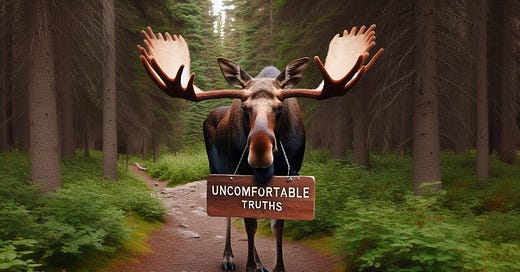I found this post by Andrew Richards interesting and thought I’d share it in its entirety—
10 uncomfortable truths that NOBODY tells you about becoming a coach. Scroll on if you're easily upset...
1. Unfortunately, nobody gives a monkey's that you've just quit your job to become a coach. OK, perhaps your mum and a few supportive former colleagues do, but that's about it 😅
2. If you don't want to promote yourself, talk about your lived experience or coherently sell the outcomes that coaching can enable, you're going to have a frustrating hobby, not a business.
3. Coaching school language doesn't make much sense to non-coaches. Promises of unblocking, resonance or helping people become deeply aligned with their 'most authentic selves' can lead to some confused expressions.
4.The smug supercoach with the tooth whitened smile on the cover or Forbes or Hustle Monthly probably isn't a coach anymore. They are marketer or influencer who used to be a coach years ago, if at all. Avoid.
5. People WILL come to you because of your skills, background and personality as much as anything else. Coaching on its own as a proposition isn't a particularly tangible thing to sell without those to blend it with and a clear path to outcomes for the client.
6. You won't suddenly feel like an experienced coach once you have graduated from whatever certification you just did, anymore than you didn't suddenly feel like an experienced driver when you passed your test.
7. You WILL finally feel like a coach when you see people's lives change as a result of the decisions you help them to make. It is an amazing feeling once you have a bit of road under your wheels.
8. Being entirely non-directive in EVERY aspect of your work with your client isn't a good basis for a strong coaching relationship - people expect to be guided through the experience of working with you to some extent.
9. Joining the ICF or the EMCC helps, but it doesn't professionalize you on it's own. You are responsible for professionalizing yourself.
10. The difference between those who grow a viable business at this and those who fail isn't about talent or the love of coaching - those are essential. The difference is confidence, commitment and resilience.
*Steps off soapbox* 🫳🎤
If you read all that and you aren't discouraged then of course you'll be absolutely fine. There's ALWAYS strong demand for good coaches.
What would you add to the list?
My Reactions
First, this list is purely from the lens of professional coaching. So, I put on my Agile Coaching hat and revisited each truth.
It’s not about you. It’s never been about you. It’s about those you coach and the difference/impact you make to them.
I differ a bit. I think it’s less about promoting yourself and more about promoting your experience (domain, agile, technology, IT, real-world, consulting, stories) and how valuable that can be.
Ah, this resonates with me. I’ll extend it to all the Agile gobbled-gook language and terminology we’ve been using. Instead, communicate in the language of your clients. BTW, see #2.
Smug supercoach implies that they were once a skilled coach. I would argue that these are in the agile community and those who are fake Agile Coaches. Those who appear to be experienced and practiced but who aren’t. It is like fake news—fake coaches. Avoid both.
Skilled, artful, competent, and experienced Agile Coaching is easy to sell to clients. That is if they’re sincerely looking for someone to partner with them on change and improvement.
Training doesn’t make you an Agile Coach. At all. It takes hard work, mentoring, and experience.
Agile Coaching might change lives, but it must impact business results, business challenges, outcomes, operational efficiencies, and ROI. These are the impact imperatives for your coaching—real results.
See #5. Agile Coaching translates to Consulting. You are a partner consultant with your clients, then see #7.
Beyond professionalization, I would bring aspects of coaching ethics, ethical behavior, and self-mastery (see the ACGW). You must continuously reflect on, improve, and exemplify these!
There are critical differentiators for successful Agile Coaches, but they are not the exact attributes. I would say they are Resilience and Grit, Broad Skills, Domain Experience, Humility, Professionalism, Self-Mastery, and a sense of humor.
How did I do with my translation for Agile Coaches and Coaching? What did I miss?
Many thanks to Andrew Richards for the inspiration.
Stay agile, my friends,
Bob.





May I translate these into German?
I struggle very much with point two: promoting myself and my work. Or even describing what I do :)